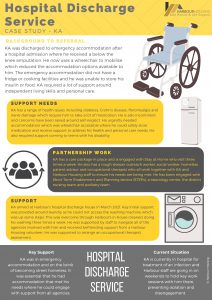Senior Research Fellow, Dr Michelle Cornes, has been working with NHS England and Improvement on the new Discharge to Assess (D2A) practice guidance, identifying good practice examples that illustrate how this new hospital discharge policy can work effectively for patients who are homeless. Here she provides one example from Cornwall Council. (302 words)
Specialist D2A Reablement for People who are Homeless
Cornwall Council working in partnership with Harbour Housing and Stay at Home have redesigned their out of hospital care services to increase the number of options available to homeless patients leaving hospital on D2A Pathways. For those patients who do not have a home and require more than just a sign-posting service, Harbour Housing provides access to six self-contained units of accessible step-down accommodation. This comes with onsite practical support such as helping people to get to their hospital appointments, as well as holistic ‘enrichment support’ for improved health and wellbeing including counselling and a range of strengths-based activities. Where people have care and support needs including self-neglect and issues linked to drug and alcohol use, a specialist reablement service is provided for up to six weeks. The Stay at Home service provides CQC regulated activities into the step-down accommodation and into the community. Specialist reablement workers are trained in the use trauma informed approaches and can for example, deliver Naloxone to prevent drug related deaths from overdose. During the reablement period, permanent housing is arranged and where necessary a Care Act 2014 assessment is carried out to identify needs for any longer-term care and support. Before these specialist D2A services were in place homeless patients would usually have stayed in hospital for long periods (sometimes up to six weeks) while waiting for various care and housing assessments to be completed.
Hospital Discharge Service Case Study – KA (Harbour Housing)
Dr Michelle Cornes is Senior Research Fellow at the Policy Research Unit in Health and Social Care Workforce, King’s College London.
